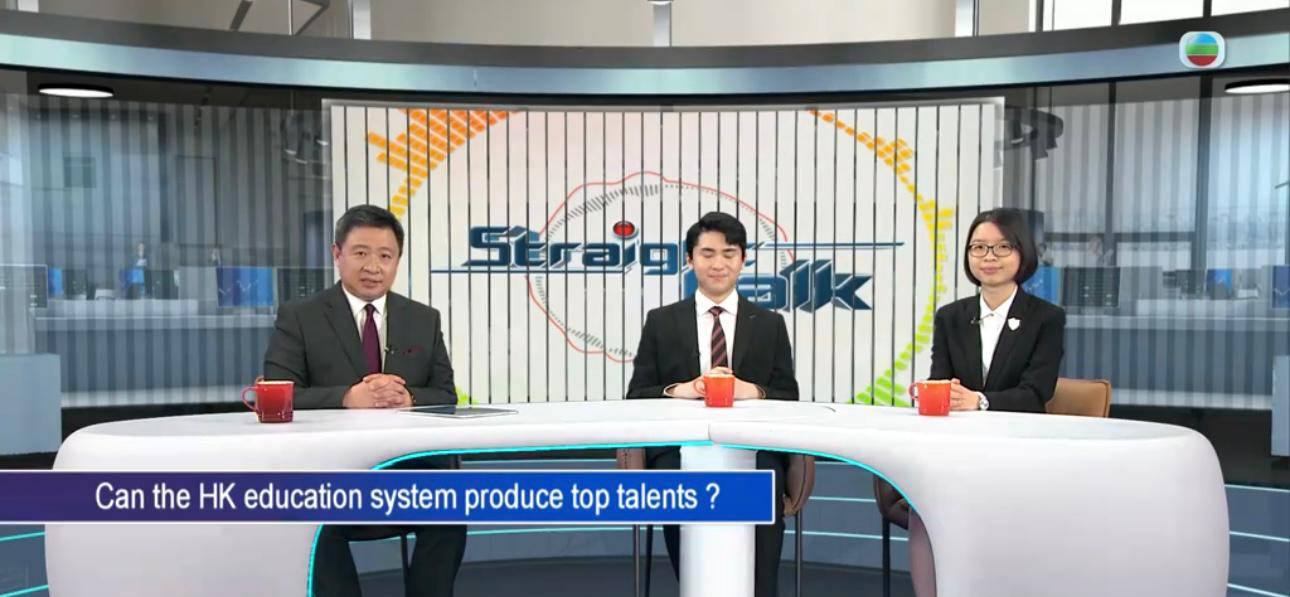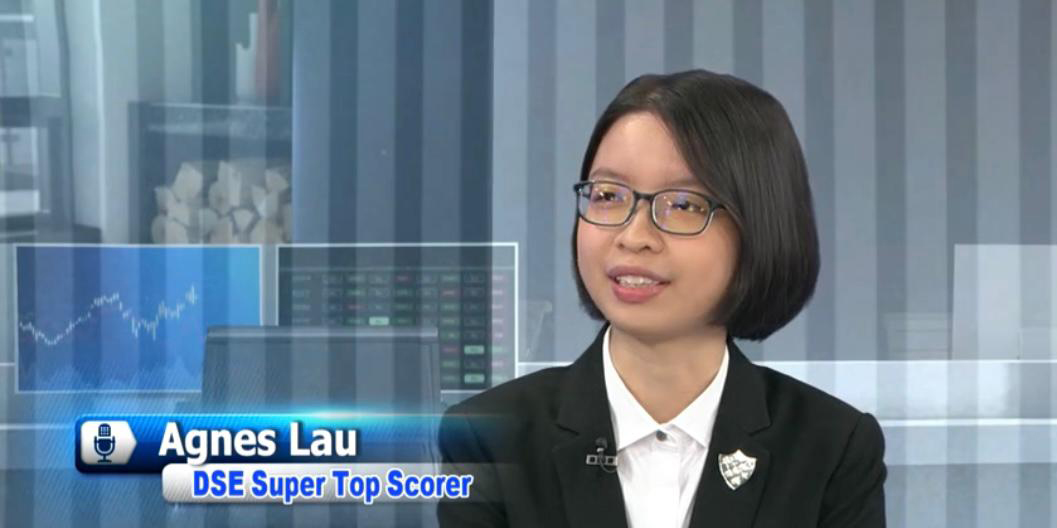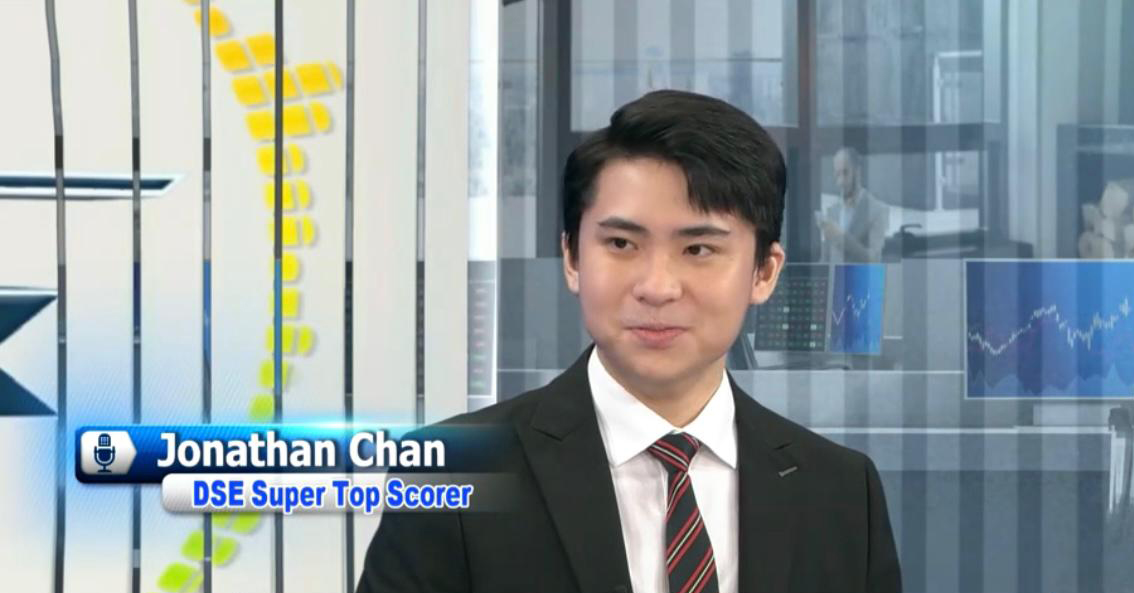
In the second installment of our Hong Kong Diploma of Secondary Education (HKDSE) exam results special, Straight Talk has invited two more graduates on the show.
Agnes Lau and Jonathan Chan are among top graduates this year, and they share with us their past struggles and future aspirations, hoping to inspire others who must tread through the HKDSE.
Check out the full transcript of TVB’s Straight Talk host Dr Eugene Chan’s interview with our DSE graduates:
Chan: Good evening! I'm Eugene Chan and welcome to Straight Talk. Last week, we had two recent DSE graduates on our show. One from an English-speaking background and the other from the Chinese mainland. We talked about how well our education system caters for all our students from all different backgrounds and abilities. This evening, we have two more recent graduates who will also share their experiences and insights. On my left is Jonathan Chan and on the right is Agnes Lau. Welcome. So, let’s start with Jonathan, you being the gentleman. Maybe you can share with our viewers which school you went to and how happy you are with the results.
Jonathan: Well, I went to Diocesan’s Boys School and I’m definitely pretty satisfied with my results.
Chan: And Agnes?
Agnes: I went to Ying Wa Girls School and I’m also very satisfied with it.
Chan: Right, and I think that both of you are the super top scores, am I correct?
Agnes and Jonathan: Yes.
Chan: Maybe Agnes, you can explain to the viewers, what are top scorers? And what are super top scorers?
Agnes: Okay, so the difference between top scorers and super top scorers is that for super top scorers, they also score 5** in mathematics extended part module one or two. So, for both Jonathan and I, Jonathan took M2 and I took M1, and apart from the core subjects and the three electives, we also scored 5** in our mathematics extended module.
Chan: Right. So, there are only eight of you who are super top scorers. So, Jonathan, did you expect this result? Or it came as a real surprise?
Jonathan: It was still pretty much a surprise to me because I thought I had messed up a few subjects at first. But yes, so, it’s kind of surprising as well.
Chan: Agnes, for yourself, are you surprised?

Agnes: Yes, I was quite surprised at that moment but then I was very grateful. Because without all the help I received from my parents and my school and all the support that I had, I wouldn't have been able to achieve these results.
Chan: Since you mentioned parents, I mean how did they support you so that you had such great results?
Agnes: Since I’m the only child in my family, since I was small, I was given all the support and all the love they have for me. For example, they will cook for me so that I can grow up healthy and they will always talk to me so that I can relax when I’m studying hard.
Chan: And I think your parents are here today as well.
Agnes: Yes.
Chan: What will you say to them in front of a 7 million population?
Agnes: Thank you and I love you.
Chan: Right, and Jonathan?
Jonathan: Yes, I’m also really grateful for my parents as well. My parents have also tried their best to provide me with a lot of care and support and not just academically but also mentally, and probably talking with me when I’m feeling stressed about the DSE as well. Yes, I’m really grateful for all they have done for me.
Chan: When you say you’re stressed, how stressed are you?
Jonathan: Pretty stressed, I would say. But sometimes, it’s just like burnt out from all the work when you feel like you've probably done quite a lot of things, a lot of practice but still not much improvement sometimes and probably… you really feel the target or goal of DSE is quite far away still and you’re not feeling too powered and that’s when your parents come in and you know, give you a little bit of mental encouragement.
Chan: Right, I mean, you’re from an all-boys school.
Jonathan: Yes.
Chan: I mean, I’ve never been to boys school myself, only been to co-ed schools. Can you show your weakness in front of other boys when you’re stressed?
Jonathan: Yes, I think I can because… especially in front of friends I trust. I think that we just get honest and frank sometimes and when I'm feeling frustrated, I just vent to them about … how I feel about certain subjects or maybe how frustrated I am sometimes and they are pretty good listeners. So, they’ll listen to what I talk about and sometimes they share with me their problems as well. We’re okay with opening up to each other definitely.
Chan: Right, both of you have one thing in common that you both had the support from the Academy of Gifted Education. I must declare that I have the privilege of being the Chairman of the advisory committee. So, anything about the Academy of Gifted Education, you can tell me directly and we’ll definitely make some improvement or the reinforcement of the good work we have done. So, I mean all these were established by our past Chief Executive Donald Tsang and the Academy which is funded by the government, works with schools and universities and we provide a lot of off-school gifted education programs. So, how much time do you spend with the Academy of Gifted Education, Agnes?
Agnes: Okay, so talking about gifted education, I remember I joined the competition called the International Biology Olympiad held by HKAGE last year. So, as a competition for students who are interested in biology and during the competition, we had to drill on some past papers and study some biology that is not in our current DSE curriculum but I found the competition really interesting because the questions are not like those which appear in the DSE. Which in this case, we have to think out of the box, we have to apply the knowledge we learn in the classroom, into the new context in the questions. So, I think this kind of education encourages us to get out of our comfort zones and not just to be confined into the DSE curriculum.
Chan: Jonathan, yourself?
Jonathan: So, I’ve taken part in the IJSO, International Junior Science Olympiad, myself. Which is also organized by the HKAGE. Yes, and I think it’s also pretty helpful because not only do you think outside of the box as Agnes mentioned, I think there’s another advantage of these competitions, in the sense that they provide you with the opportunity, or the medium, to meet like-minded people. Especially people who are gifted. Because sometimes when you are alone and you just think on your own right? Your mindset is just your own. But then when you talk with other people who are also gifted or talented, they may inspire you as well because after all, they also have a lot of new ideas that they can share with you. If you meet people who are similar to you, you may actually try to strive for excellence together and I think it’s a pretty big benefit, because you’re not just battling alone but you have friends to go along the journey with you.
Chan: Right, you know with… you are from a very good school yourself, Diocesan’s Boys School. How has the Academy helped you extra to that? I mean, has it been instrumental do you think?
Jonathan: I think it has been very beneficial to say the least. Because it also gives you a lot of exposure. Not just meeting people, you also probably get to expose yourself to a wider range of knowledge as I just mentioned, you think outside of the box. You don’t just probably do exam-oriented stuff, which is what the schools probably aim to teach us. After all, they’re trying to prepare us for the public exams whereas these competitions, or these courses organized by the HKAGE, their main goal is not to prepare you for any exam but probably just to enlighten students or to inspire them. So, I think it’s much better because you’re not as stressed to probably perform well in public exams and also, you can really try to broaden your horizons.
Chan: You see, one of our policies in Gifted Education is we want to bring the competitions, not only from local or regional but international competitions to the students of Hong Kong. So, Agnes, I believe you were the only female super scorer this year but you also had the Olympiad bronze medal that you had mentioned earlier. So, how has that helped you in gaining your confidence and also your… in terms of gearing up for the DSE exams?
Agnes: So, I think these kinds of competitions not just give us confidence but it also lets us know in which area that we have to improve on. On one hand, of course, after joining these competitions, we will know what strengths we have. For example, I found my interest in science after joining these competitions. I also know that I may be interested in exploring more in this field in the future. On the other hand, I would know what my weaknesses are and I would know that there’s still a lot of talents and elites in the outside world and I know that I have to work hard and to make improvements so that I can really achieve excellence.
Chan: Right, Jonathan. I mean you had your friend from school, you had your gifted education programme to help you. Have you encountered any challenges that you felt were difficult?
Jonathan: Well, you mean during DSE?
Chan: Yes, during DSE.
Jonathan: Oh definitely, yes. Because I think DSE is like a marathon. You don’t just like to sprint probably in a month or… that’s not how it works. You’re supposed to maintain a heartfelt learning or that sort of mindset over a period of time and it’s inevitable at sometimes, you may feel frustrated because you don’t think you have performed up to par or what your expectations are sometimes. You know, you feel frustrated because you don’t understand certain concepts. Well, they’re definitely have been difficulties but I’m really grateful to god as well as my parents and also my friends who’ve invited me for lots of support who’ll probably try to get over these difficulties along the way.
Chan: Before I forget, what will you say to your parents?
Jonathan: Same words. Thank you and I love you.
Chan: Thank you. So, Agnes, I saw last week, I asked some of our fellow students about Hong Kong’s system, which has been known for rote-learning and also places a very heavy emphasis on examinations. How has that affected your learning, do you think?
Agnes: So, I think there must be a reason why people would think the education system is exam-oriented. So, I do think, to a certain extent, our curriculum and mode of teaching are a bit exam-oriented because after all in form six we have to take the DSE. So, during lesson time all the teachers have to spend some time on teaching us exam skills because when it comes to the exams, it’s not just about how much knowledge you have but also about the skill sets, about your mentality, your time management. So, yes there would be certain exam elements in lessons while on the other hand, I think for example, my school is already trying to incorporate more elements apart from exams in our everyday lessons. For example, in biology, we have field trips. For history, we will visit museums. So, I think these experiences really enhance our interest and knowledge outside the textbooks.
Chan: Alright, let’s take a short break now. Viewers, stay tuned and we will be right back.

Chan: Thank you for staying with us. We have been exploring the question “Can the Hong Kong's education system produce top talents?” We have Jonathan Chan and Agnes Lau, two DSE super top scorers with us this evening. So, Agnes and Jonathan, thank you for sharing with us the experiences that you gained from the Hong Kong Academy of Gifted Education, and how it has helped you in preparing for the exams. So, let's move on to the next stage of your life. I mean you are now 17-18, you are moving on to university. Agnes, have you decided what you want to do and what is your plan?
Agnes: My dream is to study medicine and become a doctor, so, I hope I can study medicine in university, and hopefully become a doctor whom I always aspire to be in the future. So, because since I was small, I always wanted to use my knowledge and skills to help other people in any way I can, so I also enjoy doing some volunteer work. So, when I am studying in secondary school, I found that I am quite interested in science subjects. So, I think if I can learn more about things like a human body and why there are diseases, things like that, and by studying medicine, then I can apply my knowledge and skills into helping others to alleviate their sufferings. It is very meaningful.
Chan: Right, so, where will you pursue your study in medicine?
Agnes: I think I will probably go overseas because I think although, of course, the medical schools in Hong Kong are very good and top, but I think by going overseas, I can be exposed to more culture, and I can look at how the healthcare systems in other places of the world work. So, when I come back to Hong Kong, I can apply what I have learnt, what I have seen, into helping improve the system in Hong Kong.
Chan: So you will come back?
Agnes: I do hope to contribute to the society of Hong Kong in the future.
Chan: Right. Jonathan, yourself? Any plans?

Jonathan: Yeah, for me I am planning to study medicine as well in the university, and I think I am going to study local, most likely CUHK I believe. And the reason for me to become a doctor is somewhat similar to Agnes’, in the sense that I am also quite interested in science subjects, and I think that the learning progress in medicine really can satisfy my learning desires. Apart from that, I think that it also has something to do with my own character because I feel like I am a person who likes to probably interact with others. And I think by being a doctor, it's not just about healing your patients physically, but also healing them mentally as well. And I think that especially in life and death situations where the patients probably are already really frustrated with probably their sicknesses, I think it's crucial that the doctor also provides mental care for them, and probably try to provide them with some care. And not just focusing on the physical aspect, but also on the mental aspect as well. And that's what I aspire to become in the future.
Chan: Right. I mean you are quite determined to tell me you are going to CUHK.
Jonathan: Yes.
Chan: Why not overseas? Why not HKU?
Jonathan: Well, as for why not overseas, I think that I have always been quite attached to the city, so I think that I do prefer the study environment in Hong Kong. And also lots of my friends are studying locally as well, so that is also somewhat a concern. As for why not HKU, this is a pretty interesting question.
Chan: That is why I am asking you.
Jonathan: Yeah, I know, I know. It really was a difficult, tough choice for me. But I think I prefer the learning environment in CUHK overall, I think.
Chan: Right. I mean last week, when we had the other two students, I said to them as Straight Talk, we do go directly into the innermost of yourself, rather than just talking about general education. Someone said to us that Hong Kong’s social ladder has been broken, meaning that in the past you’d be able to climb up socially by working hard and studying hard. But that seems to be broken somewhat. Do you agree, Agnes?
Agnes: So, I think yes to a certain extent because for students from lower socioeconomic groups, indeed their families have less money and resources to support their learning. For instance, they may have…they cannot join as much ECAs as other students do, and they may need to help their family. For example, in earning a living, and they may have to help with more housework after school, instead of joining tutorials or other activities like their friends. But I think in general, the education system in Hong Kong already provides more support to these students. There are different schemes and grants for them. So, I think if more support can be provided to the students, then they would have a higher hope to climb up the social ladder.
Chan: Right. Jonathan, what do you think?
Jonathan: Yeah, I think I mostly agree with Agnes’ view. I don't think that the social ladder is totally broken, but certainly there are some gaps to a some extent. But I truly do believe in the Chinese proverb that knowledge can change lives. And I think that if students probably from lower social economic classes, they study hard enough, they definitely can get into, you know, probably some universities with good subjects and good career paths in the future. But nonetheless, it definitely is more difficult for them because as mentioned by Agnes, there are less resources provided by these families in general. The government has already done its role, I think somehow, by providing probably free education or you know some grants to these students as Agnes mentioned. But yeah totally there could be definitely some more support to them in order to probably help them to progress as well.
Chan: You know in the last few year Hong Kong has gone through a lot, many incidents we had the riots we had the COVID and now we are back to restart again, but with the economy is not doing so well. We all know that. Do you think people are more, especially the younger generation people often say we often have to start with young people. People of your age group, are they happy with Hong Kong right now? Do you think?
Agnes: I think for myself, yes there are a lot of changes for Hong Kong in recent years. But I think these changes are very important for us to hold on to our core values and what we want to do because changes is quite common in this world, the world is developing very quickly, it is ever-changing. So, I think although there are maybe challenges, but I would tell myself to have the mindset of perseverance and tell myself to keep learning and to acquire knowledge about the latest advancement, so that when I learn more and acquire more knowledge in the future, I can apply them to suit the needs of the society.
Chan: Jonathan what do you think?
Jonathan: I think, for myself personally I quite like the environment of Hong Kong despite these changes. I think Hong Kong has always been a pretty good environment for people in general, there are definitely are things that Hong Kong could use changing probably, in the cultural industry, maybe more improvement on that. But I would say that regardless, Hong Kong has always been a pretty nice city for…I think me and my friends would all agree that Hong Kong does provide a pretty good environment.
Chan: So, both of you are sort of, I would use the word, products, of Hong Kong education system, especially couple with the sort of advanced training by the Hong Kong Gifted Education Program. So, how would you rate Hong Kong education system overall, Jonathan?
Jonathan: I think that I would say that many people have criticized the Hong Kong education is pretty spoon-fed, and I would say that that is to some extent true, but not entirely true definitely. And I think that there are also some benefits, in the sense that especially for younger learners, you know, their thoughts are…they are not really mature yet, so, they don’t’ really know where their interests are, or probably how to learn a subject, how to begin with. I think Hong Kong’s education does a pretty good job at providing an introduction for these the students, probably learning the basics of certain subjects first before, you know the students when they get older, they get more mature, and they realize their interests. Then with the introduction and with the basis that they already have, they can probably go on to dwell into the subjects on their own. For example, probably via the online resources that we have nowadays, as we are in the technological era right now, lots of stuff with that we can look into. Or probably participating in projects or exams, I mean not exams, projects or competitions, or stuff like that. You know, there is really lots of stuff that young people could do, I would say.
Chan: Right. Agnes, since he mentioned technology and all these digital skills, how do you think we should incorporate them into our system? Or actually in other words, has enough been incorporated?
Agnes: So yeah, I think technology is developing very quickly in recent years. So, for example, in schools, we would also use different devices and use e-learning. Indeed using like iPads, notebooks, to maybe checking textbook pages and writing notes is more efficient compared to papers. So, I think a lot of schools is already incorporating a lot of these technological elements into education. Well, I think it is always not enough because there will always be new developments. But I think the most important, like, principle, is that although there is a lot of new stuff appearing, do we have to adopt all of them? Because education should be student-oriented. So, we have to pick those technologies that really help the learning of students, instead of distracting them even more.
Chan: Right. So, we only have the last minute of the show. And for both of you, I want to ask you a last question. You two have been sort of really perfect products of the system, I mean you are going to do the career that you want to do in the next few months. If you can pick one problem for Hong Kong’s education system, what is that and how do we fix it, in short?

Jonathan: I would say that if there's one problem, it's that it doesn't involve enough creative work, I would say, because at the end of the day, Hong Kong’s education is still pretty exam-oriented. And I think that the students are not quite confident with probably creative work, so yeah.
Chan: Right, Agnes?
Agnes: So, I think if I really have to pick one problem, I would say we should build more confidence into Hong Kong’s students because maybe most students are more focused on studying and doing exam papers. But when it comes to presentations, they are usually less confident in doing so. Or maybe it is because they are always in a very stressed environment, they are afraid of not doing well. But I would hope Hong Kong students can know that each of them have their own potentials and all of them can shine very bright, so they can be more confident in themselves.
Chan: Right. I'm afraid that we have to leave it there. And as we conclude our discussion, I want to express my appreciation to our guests this evening, both Jonathan and Agnes, as well as last week’s Pratik and Jenny. All top talents and products of Hong Kong's education system. We wish you all the very best for your future. As top talents from our education system, you are very much a part of the future success of Hong Kong. Thank you for joining us and have a good evening!


